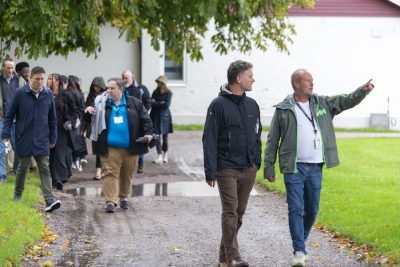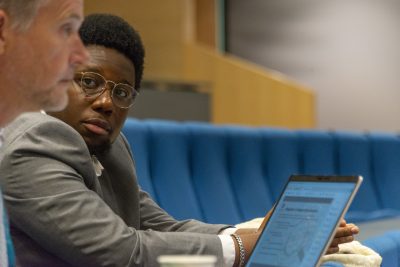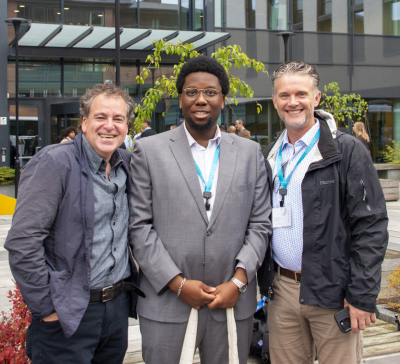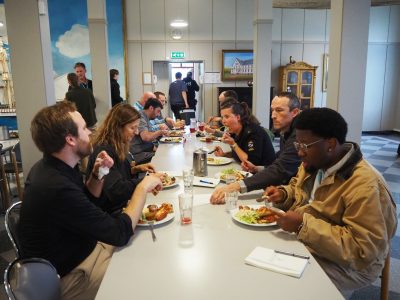The handshakes were among the first things that stood out.
In Norway’s correctional system, incarcerated individuals aren’t confined behind bars. On this day, they greet their visitors warmly – with handshakes.
That simple gesture of human connection set the tone for the International Justice Exchange’s recent immersion trip to Norway, where Connecticut stakeholders explored international correctional models that emphasize dignity, trust, and rehabilitation.
“We all have this perception of what an incarcerated person looks like,” said Chidi Nwuneli, a 2025 MPA graduate of UConn’s School of Public Policy and the current Grants and Contracts Specialist at the Criminal Justice Policy and Planning Division of Connecticut’s Office of Policy and Management (OPM). “In Norway, the focus is on humanizing the person, not the punishment.”
In Norway, the focus is on humanizing the person, not the punishment.
Held September 7th – 12th, the trip offered participants an in-depth look at the Norwegian Correctional Service as part of a partnership between the Institute for Municipal and Regional Policy (IMRP) and Amend at the University of California, San Francisco.

Connecticut Department of Corrections (CTDOC) personnel were Amon those in attendance, as well as delegations from the state of Washington and other public-sector partners.
For Andrew Clark, Director of the IMRP, this marked his third IJE visit to Norway. The initial trip in 2022 was exploratory; by 2024, the partnership had become formalized, and CTDOC leadership joined to launch collaborative projects with Amend at Garner and York Correctional Institutions in Connecticut.
“Each time we return, we learn more and take away new nuances,” said Clark. “This trip allowed us to visit different facilities, including Ringerike Prison, and to spend more time understanding how training at the academy is fully integrated into the correctional system.”

For Nwuneli, the experience offered an opportunity to reflect on system differences and gather insights that could inform his funding work across the criminal justice continuum, from pretrial to reentry, and behavioral health and diversion programs.
“Sometimes you have to see it yourself,” he said. “Seeing it work somewhere else might inspire us to reflect on what we’re doing here – and how to better modify.”
A New York City native, Nwuneli moved to Hartford for his first job at OPM after earning his bachelor’s degree in political science from Quinnipiac University in 2020. His early work focused on criminal justice projects related to the COVID-19 response.
He pursued his Master of Public Administration (MPA) at UConn’s School of Public Policy, earning his degree in 2025, while continuing full-time at OPM.
“Everyone I met at OPM emphasized the value of an advanced degree,” he said. “UConn’s program stood out for its strength in public finance and government project management, which aligned with my interests.”
Today, Nwuneli manages a portfolio of federal and state grants supporting reentry services, community-based violence prevention, behavioral health interventions, and other justice initiatives.
“Our division’s work includes all criminal justice areas from diversion and pretrial to post incarceration,” he said. “Seeing how Norway approaches all stages of the justice system, both before and after incarceration, was invaluable.”

Nwuneli attended alongside Daniel Karpowitz, OPM’s Undersecretary for Criminal Justice. Together, the group visited facilities including Ringerike, Indre Østfold, Halden, Ila, and Bastøy prisons, meeting with both correctional officers and incarcerated individuals. Days were filled with educational workshops on correctional officer training, rehabilitation practices, and reentry programs.
Nwuneli noted that incarcerated individuals in Norway remain active citizens – with the right to vote – and face no permanent stigma upon release. “You did your time, and you’re done,” he said. “There’s no post-incarceration registry or ‘Scarlet Letter’ following you.”
That philosophy is intentional, says Per Sigurd Våge, Director of the Norwegian Correctional Services’ International Unit and a partner in the International Justice Exchange. “We are building a safe society,” Våge explained. “When we release people, we are building safe neighbors.”
We are building a safe society. When we release people, we are building safe neighbors.

The visiting delegations also had the opportunity to dine together with inmates and enjoy a meal prepared for them by those in custody.
“They have access to fresh food and cook communally,” Nwuneli explains of the role nutrition plays. “They have far lower levels chronic illnesses in their incarcerated population than what we accept here.”
A visit to the Correctional Service of Norway Staff Academy (KRUS) highlighted another major difference: the depth of officer training – two years of training in Norway vs. 14 weeks in Connecticut. Additionally, many Norwegian correctional officers come from backgrounds in social work, education, or mental health.
“They bring those experiences and became corrections officers trained to help people,” explains Nwuneli. “In the U.S., most of our corrections officers lack that experience and have to be taught the humane side.”
“I don’t think we can solve this on one trip, but I do think it puts us in the right direction,” he concludes. “The insights gained will help guide how we shape and fund pilot programs moving forward.”
The delegation also visited the Nobel Peace Center, a museum dedicated to the Nobel Peace Prize and its global impact.
Each visit helps us expand our horizons and discover new ways of doing things.
Clark notes that another delegation will return to Norway in November, part of ongoing efforts to engage with international partners and bring best practices back home.
“Each time we go, we gain valuable feedback about our work in Connecticut relative to other states and jurisdictions,” he explains. “Each visit helps us expand our horizons and discover new ways of doing things.”